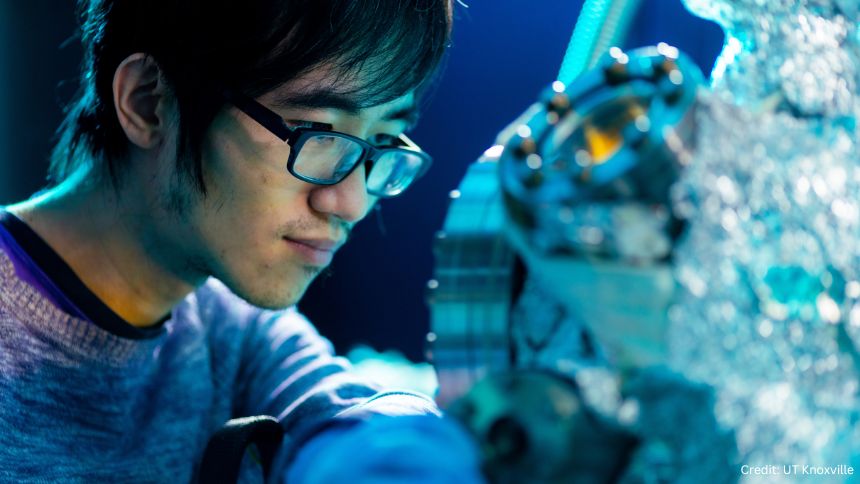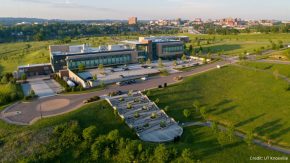
NSF investing $18 million in prestigious new research center at UTK
The new Center for Advanced Materials and Manufacturing at UTK will receive $18 million in NSF funding over six years to develop sophisticated AI and computational tools and deploy them in the design and synthesis of next-generation materials.
The University of Tennessee, Knoxville (UTK), has been awarded a prestigious Materials Research Science and Engineering Center (MRSEC) from the National Science Foundation (NSF) to spark discoveries that will lead to new industries in clean energy, computing, and national security.
The new Center for Advanced Materials and Manufacturing (CAMM) at UTK will receive $18 million in NSF funding over six years to develop sophisticated artificial intelligence (AI) and computational tools and deploy them in the design and synthesis of next-generation materials in two areas: quantum materials and materials for extreme environments. CAMM researchers will characterize these revolutionary materials using state-of-the-art instruments at UTK and Oak Ridge National Laboratory (ORNL).
“We have a deep bench of expertise in quantum materials and materials for extremes,” said Chancellor Donde Plowman. “This prestigious NSF award recognizes the ingenuity of our faculty, staff, and student researchers and makes clear that UT Knoxville, and the state of Tennessee, is a global leader in these areas.”
Next-generation materials and manufacturing are central to meeting the future needs of society, including ensuring the widespread availability of sustainable energy sources, supporting advances in computing and communications, enabling a global transition to a circular economy, and promising a safer and more secure future for people around the world.
Professor of Physics and Materials Science Alan Tennant will direct the center.
“CAMM is a model for interdisciplinary research and innovation,” said Tennant. “We are leveraging all the capabilities we have to advance the materials frontier while also developing our nation’s future leaders in these areas. And by working with companies like Lockheed Martin, Volkswagen, and Eastman, and launching new high-tech start-ups like SkyNano that will co-locate with us here in Knoxville, we are ensuring that our innovations create economic opportunities for Tennesseans.”
Associate Professor of Materials Science Claudia Rawn will serve as Deputy Director and as Director of Education and Diversity. Department Head of Physics and Astronomy Adrian Del Maestro will lead the Quantum Materials Initiative and UT–Oak Ridge National Laboratory Governor’s Chair for Nuclear Materials Steve Zinkle will lead the Materials for Extreme Environments Research Initiative.
“If you look at all the existing MRSECs, there’s a huge geographical gap, which is in the southeast. There’s basically nothing there,” said Del Maestro. “This will really be one of the first ones in this area, so we saw that as a reason why the time was right to go after this with the team that we’ve assembled here at UT Knoxville.”

CAMM will engage undergraduates, graduate students, postdoctoral trainees, and junior faculty who will become tomorrow’s university and industry leaders, all in a variety of different fields. Del Maestro’s first group of ten graduate student researchers coming in this fall will not all be engineers.
“The initial cohort will involve mathematicians, computer scientists, electrical engineers, physicists, chemists, and material scientists, so that’s a pretty diverse group of people,” he said.
Much is still unknown about quantum materials, but the acceleration of research pairing AI with theory and application is essential to ensure continued U.S. leadership in the global economy. Technology spaces that will be impacted range from energy harvesting and low-power electronics to progressing quantum computing and the development of sensors with unprecedented sensitivity.
The CAMM team will advance the pace and scope of quantum materials discovery by using AI and experimental data to learn and refine models for quantum materials, uncover the guiding principles responsible for desired materials functionality and provide AI capabilities for experiment steering and analysis for multibillion-dollar facilities used by the national science and engineering communities.
“Our goal is the rational design of materials, meaning, ‘can we design materials for a specific new technology or task?’” said Del Maestro. “One of the things that we’re thinking about, for example, is post-silicon technology. How can we harness the power of quantum mechanics to do new things, to do applications that just aren’t possible via classical technologies?”
The team will share the technologies and know-how developed with the national materials science and engineering community through an AI computational user facility and other mechanisms.
Under Zinkle’s leadership, his team will focus rather on energy. Creating safe nuclear reactors for sustainable clean energy production and advanced propulsion technologies such as hypersonic flight requires materials that can reliably maintain structural stability and not break down.
“We are seeking a leap forward in high-performance materials by merging atomistic calculations, high-throughput thin film synthesis, and exposures to extreme pressures, temperatures and particle radiation to rapidly screen promising compositions of complex concentrated alloys and ceramics,” said Zinkle. “Applications could range from the next-generation of refractory complex concentrated alloys with environmental barrier coatings for hypersonic transport to damage-resistant high-temperature materials for proposed fusion and Generation-IV fission reactors.”
CAMM researchers will design, fabricate and test new complex metallic alloys and ceramic materials that could replace today’s steel and nickel-based alloys.
The team will use machine learning and AI to accelerate the discovery of materials behavior, ultimately enabling new materials and design principles for extreme environments as well as models for use by the scientific community.
CAMM was announced live by NSF Director Sethuraman Panchanathan during a daylong visit to UTK on June 26 that focused on a recent “NSF Regional Innovation Engine Development Award. Named “TEAM TN,” it was given to UTK and its partners to establish Tennessee as a global leader in the $2 trillion transportation mobility economy.
Like what you've read?
Forward to a friend!

